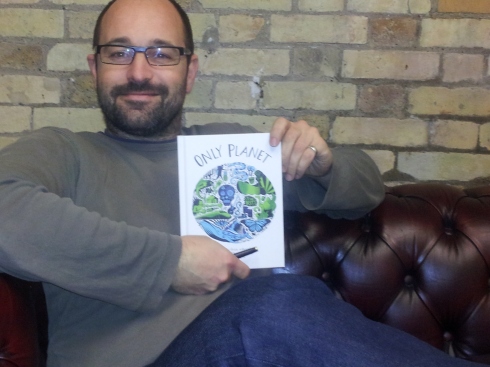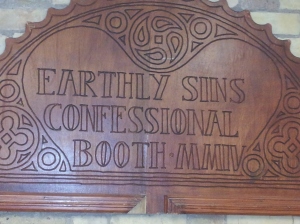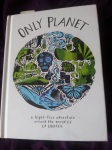This blog is about family travel around the world without leaving the UK. Impossible? No. This post looks at some strange ways people pretend to be away on holiday (when in fact they are just faking it). Words from Nicola Baird (see www.nicolabaird.com for more info about my books and blogs).
 |
On Buzzfeed Zilla Van Den Born talks about how she combined her two passions, manipulating photos and travel
so she could create a fake-cation in Thailand that was the envy of her friends and family, story here. Van den Born: "I wanted to prove how easily reality gets distorted". |
The
internet savvy woman from Amsterdam who faked her Far East holiday was a fun post on Buzzfeed. It's the ultimate plane free travel! You can see for yourself how cleverly she faked it by reading
this summary. Even her Granny and best friends thought she'd gone away for six weeks... All she did was don a head scarf and get busy photoshopping at home.
My
kids do fake-cations all the time, just by taking selfies in front of the palm trees on the Mac Book photo booth.
In many ways this blog
aroundbritainnoplane.blogspot.com is also about fake-cations. I love the way you can satisfy your longing to be somewhere else by paying attention to places locally that give you a sense of some place else... More importantly I like the way my family's low carbon adventures have kept us grounded since 2011. We've travelled a bit in the UK, and Europe, but never by plane and yet we've had tasters of 100s of different countries as you can see from the list on the right-hand menu.
If you're a travel fan but conscious of how the climate is changing, maybe trying out a different way of travelling will give you enough pleasure and adventure. Failing that when you go on holiday try and stay away for as long as possible. it's the min-break there and back plane flights that do so much damage.
For more about the power of staying home - and
ultimately the pull of being home - have a look at this interview which I recently did with sustainability and slow travel expert Ed Gillespie from the change agency Futerra. If you read on you'll see he's written a book about travelling the world without using a plane and now has a project on the go to create an app for London (or any city) that lets you travel and connect with world communities. The only snag is he needs £15,000 to fund it...
The direct link is
here (a shorter version below)
ED GILLESPIE: FUTERRA CO-FOUNDER
Everyone has a story. Are cities a good place to live? Norfolk-raised Ed Gillespie is helping make urban centres and businesses meet the needs of the 21st century thanks to his work at Futerra in Clerkenwell, and his own passion for flight-free long haul travel. Interview by Nicola Baird from http://islingtonfacesblog.com

Ed Gillespie’s love of travel inspired him to take a year’s sabbatical from the organisation he co-founded, Futerra, to travel the world over land and sea. His book Only Planet is just out and he’s established a unique concept to help people find ways to travel the world without even leaving London thanks to a very clever app which needs crowdfunding soon, see
http://www.worldinlondon.co.uk/ .
“Cities are much more sustainable than rural areas in many ways. The sharing, togetherness, toleration, activities and creativity generated in a city make for a very successful experience. It’s vital that we get it right,” says Ed Gillespie. “We need to live a little leaner” – he hasn’t flown on a vacation for the past 10 years, gave up his car 17 years ago and has no kids – “it’s a lot more creative…”
You might not have heard of
Futerra, or its co-founder Ed Gillespie, but the impact this media business has had on the way people do sustainability communications is immense. Over the past 14 years
Futerra has helped refine the way businesses – such as Kingfisher, Sky TV, Nandos -
and organisations – such as Forest Stewardship Council (FSC), Friends of the Earth and even the UN –
talk to you and me.

Now installed in an office meeting room the confession booth was used by Futerra on the festival circuit as a place for people to confess their eco crimes (4WDs, long showers) and perhaps start afresh with other greener habits.
“We’re a
positive change agency,” says the ever upbeat co-founder Ed Gillespie who employs 2
Add New5 staff In London (and another 20+ in their international offices in New York and Stockholm). The books on the shelves alongside him may be a tad negative (eg,
Green Gone Wrong), but Ed’s
eco-charged energy is inspiring; perhaps because he’s sitting on one of a pair of Chesterfield sofas positioned under a carved wooden sign that suggests we’re in an ‘Earthly Sins Confessional Booth’?
“About 10 years ago we used to
take the booth to festivals, including Glastonbury, “ says Ed grinning. “We found guilt was a barrier to action, so let people confess their sins so they could progress to more sustainable behaviours.” So far so serious, but then Ed admits, “It was
an excuse to dress up as a vicar, which I found fun. People treat you really differently. There’s still an earthly sins
Facebook page…”
Originally trained as a marine biologist, with experience working in the Orkneys, New Caledonia and Australia, Ed is the sort of person futurologists say we should be watching because he’s helping us create a more environmentally in tune way of living.
Now 42, and ready to prove Hitchiker’s Guide to the Galaxy author, Douglas Adams, right re the meaning of life, Ed’s agency has coped well despite the government cut backs. “When the coalition came in our Government work disappeared and we still work a fair amount with NGOs (charities) but about 75 per cent of our work is now from business. There is what his friend and fellow futurist Mark Stevenson calls “institutional bewilderment” about their organisation’s ability to change. “Business knows that if they don’t change there will be no choice – the big six energy companies are a good example…”
His argument is quite complex, but if business people continue thinking that unlimited growth at any cost is good, they are going to hit a problem thanks to our Earth’s finite resources. What they need to do now is move to services rather than products (think car sharing not owning) and secure sustainable supplies – hence the surge of interest in accredited forest management products marked with the FSC logo.
Ed clearly adores his work. He gives a great talk – always funny – and has a real skill at helping people “get it”. I’ve wanted to interview him for a long time and so made use of Futerra’s EC1 address to engineer a meeting. But like it’s previous home in Charterhouse Square Futerra has always just been on the Islington borders, not actually in this borough. And maybe it’s pushing the Islington link just too much when I discover that talented Islington typographer Derek Birdsall did Futerra’s first designs?
Excitingly Ed’s new project is working with another Ed to crowdfund £15,000 for a new app,
world in London that helps you engage with global communities who’ve settled in London. On the promotional video, see
www.crowdfunder.co.uk/worldinlondon, you can
keep your feet in Londonbut
take your soul for seriously speedy travelling. Try:
9am in Europe (having a cup of coffee)
10.30am in Africa (shopping in Brixton market)
12 noon flatbreads in Turkey
2pm in India via Neasdon Temple
4pm over to Asia with another gorgeous temple
6.30pm football cheering for Colombia
8pm grabbing a drink in Mexico
10pm partying the night away in Brazil.
Like Ed I have chosen not to use planes (our family’s last big trip was in 2011 for a three month sojourn in the South Pacific, and before that in 2000). Instead I’ve tried travelling the world without leaving the UK with my family (see the blog
http://aroundbritiannoplane.blogspot.com ) so I’m thrilled to find that
the two Eds are working on an app to make London an even better place to live and travel via crowdfunding. (feb 2015 now closed)
 Use this 33% discount code on purchase price for UK or overseas (F33RERA) to buy a cheaper copy of Ed Gillespie’s new book, Only Planet: a flight free adventure around the world (rrp £14.99). To claim your discount follow the link here. Originally a well-loved Guardian column, this is a fabulous way to armchair travel or plan your own low carbon adventures.
Use this 33% discount code on purchase price for UK or overseas (F33RERA) to buy a cheaper copy of Ed Gillespie’s new book, Only Planet: a flight free adventure around the world (rrp £14.99). To claim your discount follow the link here. Originally a well-loved Guardian column, this is a fabulous way to armchair travel or plan your own low carbon adventures.- More about Futerra at http://www.futerra.co.uk/
Over to you
Where do you know in your city that reminds you of somewhere else in the world? Do pop an answer on the comments. Thanks.














